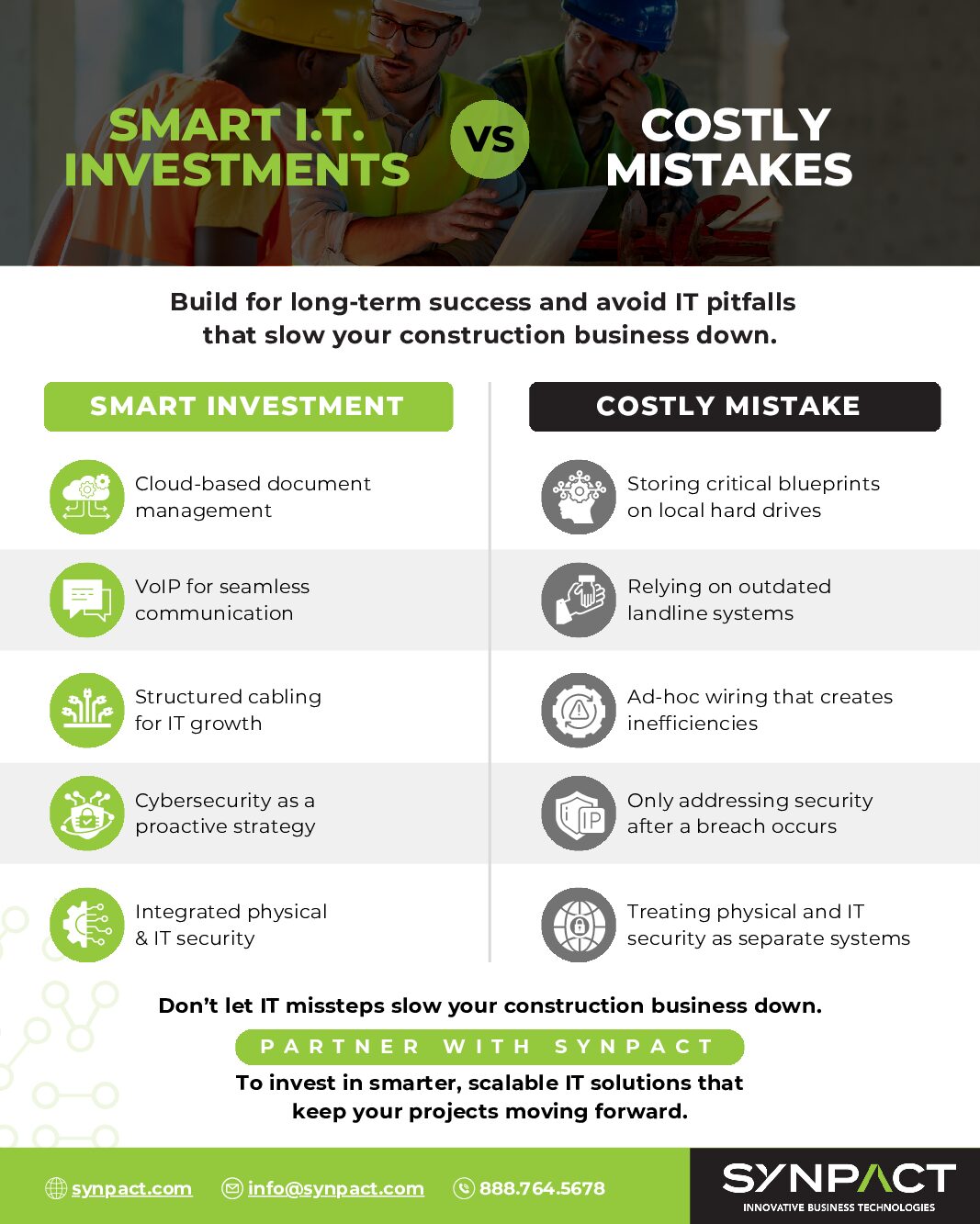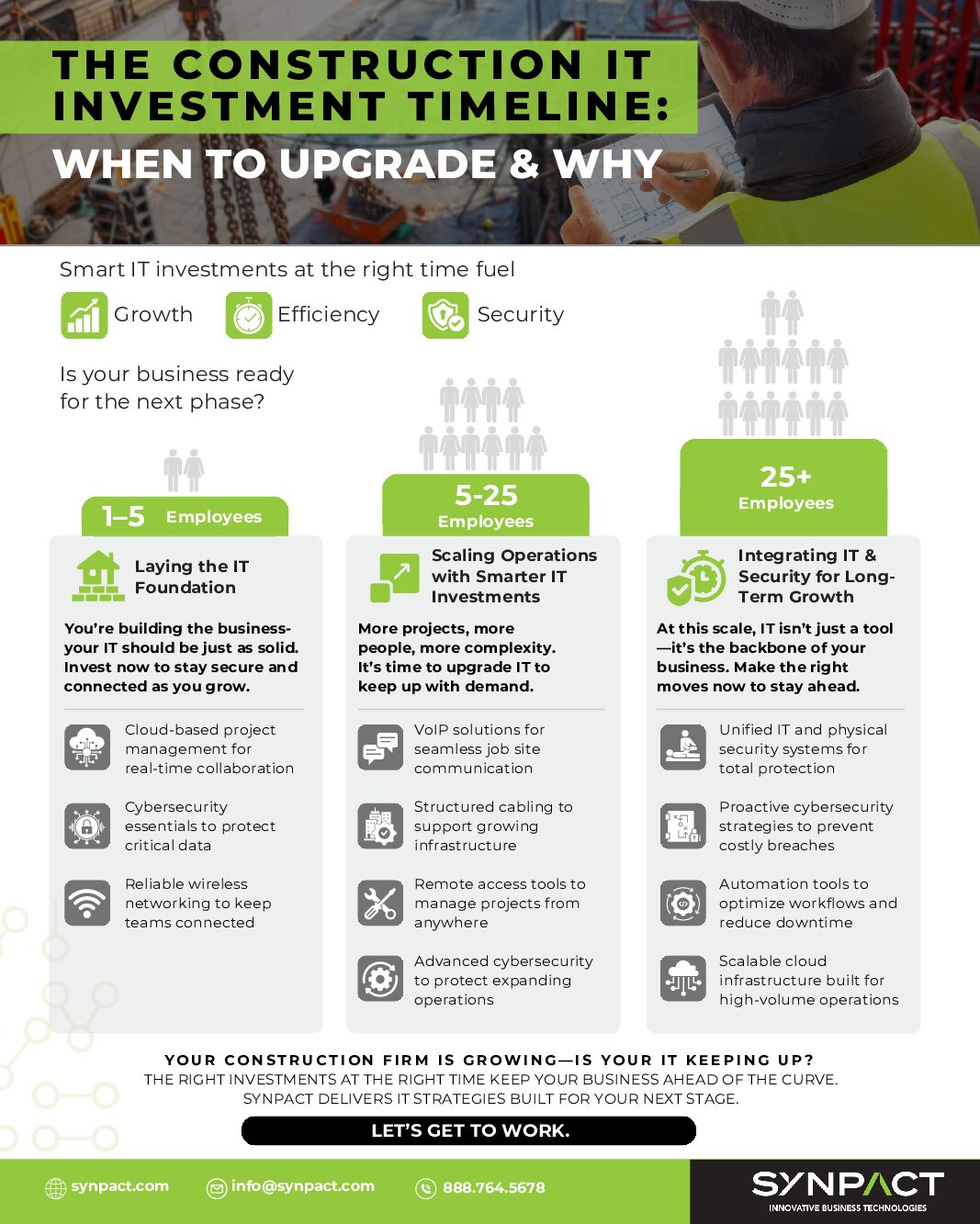The construction industry faces increasing pressure to deliver projects faster, maintain profitability, and stay competitive. In addition, the recent wildfires in California have underscored the critical need for swift and efficient rebuilding efforts, placing even greater pressure on construction companies to operate seamlessly. Delays, cost overruns, and communication breakdowns not only hinder progress but also impact your bottom line.
The right IT construction investments enhance efficiency, foster collaboration, and protect valuable assets. Companies that view IT as a catalyst for growth rather than just an operational necessity position themselves ahead of the competition. Conversely, those who delay modernization risk falling behind.
According to a report by G2, the global construction market is projected to reach $19.59 trillion by 2032, reflecting substantial growth and the increasing importance of technological advancements in the industry. This growth underscores the industry’s shift toward digital solutions that streamline project management and enhance collaboration.
Let’s explore the importance of having a strong IT Infrastructure for your construction business and how you can ensure smarter IT investments.

The Roles of IT in Construction Growth
Construction projects involve multiple stakeholders—contractors, architects, engineers, and clients—who must collaborate seamlessly. Disconnected workflows and outdated systems create bottlenecks, leading to delays, miscommunication, and financial setbacks. Strong IT infrastructure keeps your business running efficiently and prepares it for long-term growth.
10 Benefits of Strong IT
- Improving collaboration – Cloud-based project management tools allow teams to share updates, blueprints, and schedules in real-time, reducing errors.
- Reducing downtime – A reliable network infrastructure ensures your office and field teams stay connected, preventing costly delays caused by system failures or slow data transfers.
- Enhancing cybersecurity – Protect sensitive business and client data from ransomware attacks, phishing attempts, and unauthorized access with managed security services and advanced endpoint protection.
- Streamlining communication – Integrated communication platforms enable field workers, project managers, and clients to stay informed without relying on back-and-forth emails or outdated spreadsheets.
- Optimizing resource management – IT solutions for the construction industry, such as inventory tracking and automated scheduling, help you allocate materials and equipment efficiently, reducing waste and unexpected expenses.
- Providing real-time analytics – AI-powered data analytics tools offer insights into project timelines, workforce efficiency, and cost forecasts, allowing you to make informed decisions and adjust strategies.
- Increasing mobility – Mobile device management (MDM) solutions let field teams securely access company systems and update project details on-site, improving efficiency and reducing paperwork.
- Ensuring compliance – Regulatory requirements in construction continue to evolve. IT systems help maintain digital records, track safety protocols, and generate reports to meet industry standards without added administrative burden.
- Supporting remote site monitoring – Internet of Things (IoT) sensors and drones provide real-time site monitoring, helping project managers assess progress, identify safety risks, and enforce quality control without being physically present.
- Preventing costly rework – Integrated design and planning software helps catch inconsistencies before construction begins, reducing the risk of rework that can lead to delays and budget overruns.
Growth is more than just taking on new projects or expanding your workforce. Without a solid IT strategy, scaling operations can introduce inefficiencies and unexpected costs. By making smart IT investments, you can prevent these obstacles and build a strong foundation for sustainable success.

Must-Have IT Solutions for the Construction Industry
1. Cloud-Based Project Management for Better Oversight
Managing multiple teams, subcontractors, and vendors can quickly become chaotic without a central system. Paper-based processes and outdated software increase the risk of errors, project delays, and miscommunication. Cloud-based platforms bring everything together, ensuring that project teams work with the most accurate and up-to-date information.
- Real-time document access – Contractors, architects, and engineers can review blueprints, schedules, and contracts from any location.
- Automated task tracking – Project management software assigns and updates tasks, ensuring nothing gets overlooked.
- Version control – Teams always have access to the most current documents, preventing costly errors caused by outdated information.
With a centralized system, your team spends less time searching for files and more time keeping projects on track. Faster decision-making and better coordination translate to fewer delays and cost overruns.
2. Reliable IT Infrastructure for Seamless Operations
Job sites rely on stable internet connections, secure file sharing, and real-time collaboration tools. Weak infrastructure leads to communication breakdowns, slow response times, and security risks. Investing in scalable IT infrastructure supports growth and ensures that every job site operates efficiently.
- Secure remote access – Employees can connect to company systems from anywhere without risking data breaches.
- Strong network connectivity – A stable internet connection keeps teams connected to essential tools and resources.
- Scalable solutions – As projects grow, your IT infrastructure expands with minimal disruption.
Without a solid IT foundation, your teams will struggle with slow systems, lost data, and avoidable downtime. A well-planned network keeps operations running smoothly, no matter where work takes place.
3. Cybersecurity Measures to Protect Business Assets
Construction companies store valuable financial records, blueprints, and client data that cybercriminals actively target. A single breach can result in lost contracts, legal liabilities, and financial setbacks. Proactive security measures protect your business from evolving threats and unauthorized access.
- Endpoint protection – Secure every device, from office computers to mobile tablets used on job sites.
- Multi-factor authentication (MFA) – Add extra layers of security to prevent unauthorized logins.
- Regular security assessments – Identify and fix vulnerabilities before cybercriminals can exploit them.
IT security isn’t just about compliance—it’s about preventing downtime, protecting client trust, and ensuring your business can operate without disruption. A strong cybersecurity framework reduces risk and keeps your data safe.

4. Communication Platforms for Team Connectivity
Construction projects involve multiple teams working across different locations. Relying on emails, text messages, or scattered communication tools causes misalignment and delays. Integrated communication platforms ensure that everyone stays informed and aligned with project goals.
- VoIP phone systems – Reliable calling solutions that don’t depend on spotty cell service at job sites.
- Mobile workforce apps – Field teams can share updates, photos, and reports in real time.
- Unified messaging – One platform for calls, emails, and project discussions, reducing confusion.
Clear and efficient communication prevents costly mistakes and keeps projects moving forward. When your teams can collaborate without roadblocks, you avoid rework, missed deadlines, and frustration.
5. Data-Driven Decision-Making with Predictive Analytics
Construction companies handle complex timelines, budgets, and supply chains. Without real-time insights, minor inefficiencies turn into major financial losses. Predictive analytics helps anticipate potential setbacks and optimize resources for better project outcomes.
- Project risk analysis – Identify potential delays and cost overruns before they impact deadlines.
- Resource allocation insights – Track material usage and workforce productivity to avoid shortages or waste.
- Budget forecasting – Improve financial planning with data-driven cost estimates.
Making informed decisions backed by real-time data gives you a competitive advantage. By spotting risks early, you reduce unnecessary costs and keep projects on schedule.
6. IT Support for Continuous Operations
Unexpected system failures, connectivity issues, or software glitches slow down work and increase expenses. A reactive approach to IT means waiting until something breaks, causing costly delays. Proactive IT support ensures that your systems stay up and running without interruptions.
- 24/7 system monitoring – Detect and resolve issues before they disrupt operations.
- Rapid response times – Get quick support when problems arise, reducing downtime.
- Ongoing updates – Keep software, security patches, and tools updated for peak performance.
Having a dedicated IT support team reduces stress, eliminates unnecessary delays, and ensures that technology enhances—not hinders—your ability to complete projects on time.

Why Construction Companies Can’t Afford to Wait
Delaying IT investments creates ongoing inefficiencies that become harder to fix over time. Outdated systems slow down operations, increase security risks, and limit your ability to scale. Companies that hesitate to modernize struggle to keep up with competitors who invest in technology to improve productivity and protect critical business data.
- Slow, outdated systems lead to communication breakdowns, forcing teams to rely on manual processes that cause delays and costly rework.
- Weak cybersecurity protections leave financial records, contracts, and client information vulnerable to cyberattacks that can halt projects and damage trust.
- Unreliable infrastructure causes connectivity issues at job sites, making it harder for field teams to access plans, update project details, or communicate with the office.
- Disorganized data management results in lost or outdated project files, leading to errors, missed deadlines, and contract disputes.
- Reactive IT maintenance leads to unexpected downtime and expensive emergency fixes, diverting resources away from core business operations.
Construction firms that make IT a priority complete projects faster, reduce risks, and strengthen their competitive position. Waiting to modernize only adds to long-term costs and prevents your business from operating at its full potential.

Partner with Synpact for Future-Ready IT Strategies
IT isn’t just about keeping the lights on—it’s about driving business growth. Companies that invest wisely in IT today gain the flexibility, security, and efficiency needed to lead the industry.
Synpact delivers IT strategies designed to align with your business goals. With tailored solutions that support project management, security, and scalability, you can focus on delivering quality projects without IT disruptions.
Don’t let outdated IT slow down your growth. Make the right investments today to ensure your company scales efficiently. Contact Synpact to develop an IT strategy that supports your expansion goals. The right IT partner helps you work smarter, scale faster, and stay ahead of the competition.

